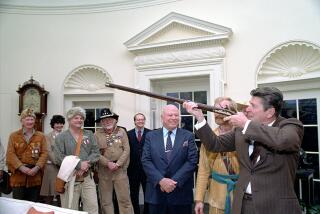Clinton on a Fast Track to No Place
- Share via
Bill Clinton’s fast-track defeat is big news not so much for its impact on trade--the world’s markets have been decisively pried open by the multinationals over the past decade--but for what it tells us about popular anger and political power. The members of Congress who remained unmoved by frantic White House appeals and promises of special favors as the vote came down to the wire did so because they feared what the voters would do to them in 1998 if they gave Clinton another victory on free trade. (The president was seeking authority to negotiate trade deals without having Congress second-guess the negotiations.)
As the White House learned over the past few weeks, people have memories. They can remember the promises amid the fight over the North American Free Trade Agreement in 1993 and they know they weren’t honored. Despite all the promises of high-paying jobs, American working people have seen wages stagnate. A third of the work force makes less than $15,000. A half-million have seen their jobs disappear, directly owing to NAFTA.
Politicians don’t mind having their arms twisted, but they do resent having their intelligence insulted. The labor and environmental side agreements pledged in 1993 meant nothing. A panel commissioned by the environmental ministers of Mexico, Canada and the U.S. (Carol Browner, head of Environmental Protection Agency, was the relevant U.S. official) reported on Oct. 26 that NAFTA’s environmental side agreements had thus far been a failure.
The 1993 promises of worker retraining and a North American Development Bank were brazenly flouted. Set up in 1993 amid great fanfare, supposedly to help border towns and other communities hurt by the trade bill, the development bank’s first loan came in September of this year, on the day that Treasury Secretary Robert Rubin was meeting with Latino lawmakers to lobby them on fast-track. Rep. Xavier Becerra (D-Los Angeles) was promised $800 million in new development bank loans and other retraining funds, but still told President Clinton point blank that he wouldn’t shift from his opposition to the bill unless there were greater protection for workers and for the environment. According to a story in the Journal of Commerce, Clinton shouted angrily on the phone, “Why didn’t you tell us you had these concerns before?” Becerra responded that he’d been trying to tell him that for four years.
The wails that free trade was destroyed in the early hours of Monday morning when Clinton was forced to retreat are vastly exaggerated. Free trade has already won the decisive victories. The Mexican economy--to take one example--was effectively forced open back in the 1980s and early 1990s, paying the price for this process in early 1995.
The significance of fast-track’s defeat is what it tells us about the future of the Clinton model of the Democratic Party--the one promulgated by the Democratic Leadership Council, in which the party would publicly distance itself from labor, minorities and the working poor. At the time of the battle over NAFTA in 1993, the Clinton model prevailed. Labor’s furious protests over the agreement were disregarded and the administration was able to split the environmental lobby by winning the support of precisely those groups with a heavy corporate presence on their boards.
This time, both labor and the environmental groups played a much tougher game. The AFL-CIO ran an aggressive series of advertisements on network TV and bluntly told Democrats in Congress that if they voted for fast-track, labor would oppose them in the next election. Not a single environmental group supported the White House, a stunning turnaround from 1993 when John Adams, president of the Natural Resources Defense Council, boasted about “breaking the back of the environmental opposition to NAFTA.”
A poll conducted by the National Journal and published on Nov. 4 showed 56% of Americans opposing fast-track and only 37% supporting it.
Bill Clinton’s credibility and indeed political future are all used up. He lied too many times, broke too many promises and, when cornered, resorted to vindictive bluster, ridiculing fellow Democrats as no-brainers who were scared of labor and the environmentalists. But labor and the environmentalists turned out to have the arguments, and the people, on their side.
More to Read
Get the L.A. Times Politics newsletter
Deeply reported insights into legislation, politics and policy from Sacramento, Washington and beyond. In your inbox twice per week.
You may occasionally receive promotional content from the Los Angeles Times.










